By: debbie lynn elias
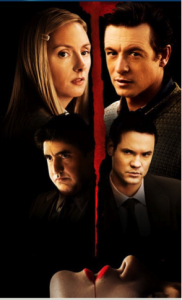 I take it as a good omen when less than one month into the new year, the thriller and horror movie genres have multiple films of exceptional quality hitting theatres around the country. One such film, THE LODGER, opens this week, and let me say right off the bat, this is one helluva movie. Mysterious. Suspenseful. Intriguing. The film tacitly demands one’s rapt attention. I couldn’t take my eyes off the screen lest I would miss something.
I take it as a good omen when less than one month into the new year, the thriller and horror movie genres have multiple films of exceptional quality hitting theatres around the country. One such film, THE LODGER, opens this week, and let me say right off the bat, this is one helluva movie. Mysterious. Suspenseful. Intriguing. The film tacitly demands one’s rapt attention. I couldn’t take my eyes off the screen lest I would miss something.
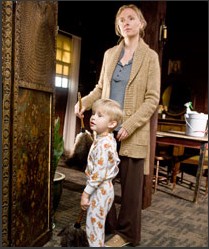 Jack the Ripper. The mere name brings chills and instills fear and curiosity. For those of you unfamiliar with the history of the Ripper, his saga began on April 3, 1888 stretching to February 13, 1891 (and lasting for over a century) when no less than eleven murders were committed in Whitechapel and surrounding areas of London, England. Over the past 100 years or so, historians have added another seven murders to the Ripper saga. Each victim was a prostitute. Two of the victims’ throats were cut followed by bodily mutilation. Strangling may also have been involved. Three victims had their internal organs removed which gave rise to theories that the killer had surgical knowledge. One had her heart removed. And each time the bodily mutilation would get progressively worse. After the murders, messages would be found written on walls, messages written in blood with pieces of cloth from the victims’ clothing. Handwritten notes penned in red ink were even sent to the media (of course) and police by the killer. The crimes were never solved which bodes well for legend, folklore, authors and filmmakers, starting with English author, Marie Belloc Lowndes, who in 1903, penned the successful novel “The Lodger”. Based on the Jack the Ripper murders, this was a story about a London family who suspects that their upstairs lodger is a mysterious killer known as “The Avenger.” So successful and potent was the novel that in 1927 Alfred Hitchcock made it into a movie, followed by Maurice Elvey in 1932, John Brahm in 1944 and now, in 2009, David Ondaatje. The key to Ondaatje’s vision, however, is that he has successfully adapted his screenplay into present day with a very liberal, and very intriguing, interpretation. Set in West Hollywood, California, the sights and sounds are recognizable to us all.
Jack the Ripper. The mere name brings chills and instills fear and curiosity. For those of you unfamiliar with the history of the Ripper, his saga began on April 3, 1888 stretching to February 13, 1891 (and lasting for over a century) when no less than eleven murders were committed in Whitechapel and surrounding areas of London, England. Over the past 100 years or so, historians have added another seven murders to the Ripper saga. Each victim was a prostitute. Two of the victims’ throats were cut followed by bodily mutilation. Strangling may also have been involved. Three victims had their internal organs removed which gave rise to theories that the killer had surgical knowledge. One had her heart removed. And each time the bodily mutilation would get progressively worse. After the murders, messages would be found written on walls, messages written in blood with pieces of cloth from the victims’ clothing. Handwritten notes penned in red ink were even sent to the media (of course) and police by the killer. The crimes were never solved which bodes well for legend, folklore, authors and filmmakers, starting with English author, Marie Belloc Lowndes, who in 1903, penned the successful novel “The Lodger”. Based on the Jack the Ripper murders, this was a story about a London family who suspects that their upstairs lodger is a mysterious killer known as “The Avenger.” So successful and potent was the novel that in 1927 Alfred Hitchcock made it into a movie, followed by Maurice Elvey in 1932, John Brahm in 1944 and now, in 2009, David Ondaatje. The key to Ondaatje’s vision, however, is that he has successfully adapted his screenplay into present day with a very liberal, and very intriguing, interpretation. Set in West Hollywood, California, the sights and sounds are recognizable to us all.
Ellen and Bunting live a quiet life in West Hollywood. At first blush one sees that something is not quite right in their household. Ellen is skittish, unsure, dowdy. Bunting, a security guard of some sort, leaves the house early in the morning, returning late at night, always taking a black bag with him. His mantra to Ellen is “take your medicine”. Their house is large and clearly, at one time well kept and prestigious. Clearly, they are in need of extra income which is evidenced by a “For Rent” sign on their front gate. As luck would have it, a renter, or lodger as Ellen calls him, does arrive at the door one morning. A handsome man with piercing eyes, a killer smile, and toting a black leather satchel, Malcolm exudes mystery and fuels long dead sexual desire and fantasy in Ellen. With a $1,000 cash payment, Malcolm has a quiet place to stay, undisturbed, while Ellen has “a friend.”
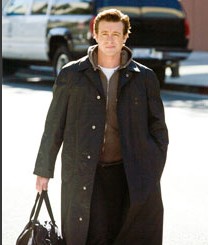
Detective Chandler Manning is on the edge. A driven man, an obsessed man, a rather frenetic man, he is estranged from his daughter and his wife is in a mental hospital. Why? Partnered with Officer Street, a rookie with 14 months on the force, Manning jumps head first, taking Street with him, into murders that are occurring in West Hollywood. Murders involving hookers. Murders that mirror those committed some years back which Manning investigated and for which the suspect was convicted and put to death. Murders that are duplicative in timing, style and precision of Jack the Ripper. Is this a copycat serial killer of Manning’s previous convicted killer? Or did Manning make a mistake in his earlier investigation? Could the wrong man have been put to death? Or is this a new “Jack the Ripper” come to life? Alone and seeming to be coming apart at the seams, Manning reaches out to his less than welcoming daughter – much like Ellen reaches out to the mysterious Malcolm, a man who leaves the house late at night and returns early in the morning, always toting his black leather satchel.
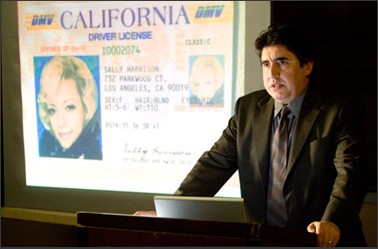 As for the acting – let’s just start with Hope Davis. WOW! She danced a fine line between fantasy and reality with the grace and finesse of a prima ballerina. Is she sane? Is she not sane? Is her husband trying to make her think she’s insane? As with the character development itself and the unfolding of each character like the layers of an onion being revealed, Davis brings that same methodical styling to Ellen. Brilliant. Donal Loque is one of my favorite supporting lead actors/character actors. As Bunting, he gives one of his darkest performances to date with a character with no redeeming qualities whatsoever. He is fascinating to watch and with each scene raises more questions as to who Bunting really is and what is he up to. Quite frankly, very cool.
As for the acting – let’s just start with Hope Davis. WOW! She danced a fine line between fantasy and reality with the grace and finesse of a prima ballerina. Is she sane? Is she not sane? Is her husband trying to make her think she’s insane? As with the character development itself and the unfolding of each character like the layers of an onion being revealed, Davis brings that same methodical styling to Ellen. Brilliant. Donal Loque is one of my favorite supporting lead actors/character actors. As Bunting, he gives one of his darkest performances to date with a character with no redeeming qualities whatsoever. He is fascinating to watch and with each scene raises more questions as to who Bunting really is and what is he up to. Quite frankly, very cool.
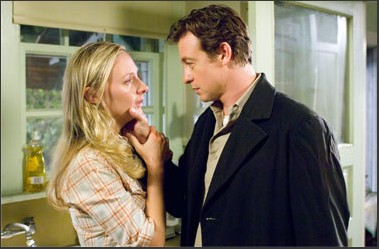
Having just seen Simon Baker in SEX AND DEATH 101 a few months back, to see him here playing the calculating, mysterious but charming lodger, Malcolm, just demonstrates the range he has an actor. He has minimal dialogue. Minimal screen time. Yet, he conveys so much with just a look; just a smile from one corner of his mouth. He exudes deliberate mystery – and sex appeal. Hell, I’d rent to him if he showed up at my door!
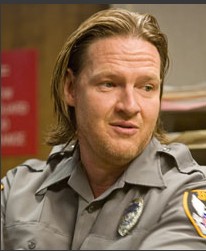 Shane West, whom I adore, is pretty much a one trick pony of energy and exuberance no matter what role he plays. As Street he is pretty much the same character he plays in ER. I kept thinking, just put him in scrubs and I could be watching him at home on tv. But it’s that initial lazy energy that he brings to a character that makes him endearing. Makes you want to root for him to jive into a situation head first with gusto – which is something his characters always do and do well, and here is no exception. Alfred Molina’s performance as Manning is interesting to say the least, but, unfortunately, he didn’t sell me on his playing a detective. He did however pique my curiosity and keep me on my toes wondering whether or not he was the killer.
Shane West, whom I adore, is pretty much a one trick pony of energy and exuberance no matter what role he plays. As Street he is pretty much the same character he plays in ER. I kept thinking, just put him in scrubs and I could be watching him at home on tv. But it’s that initial lazy energy that he brings to a character that makes him endearing. Makes you want to root for him to jive into a situation head first with gusto – which is something his characters always do and do well, and here is no exception. Alfred Molina’s performance as Manning is interesting to say the least, but, unfortunately, he didn’t sell me on his playing a detective. He did however pique my curiosity and keep me on my toes wondering whether or not he was the killer.
A small role, Mel Harris steps in as Manning’s wife Margaret and seems merely to be unpreserved window dressing in Margaret’s incapacitated mental state. Of course, requisite was the casting of Philip Baker Hall as Manning’s boss Captain Smith who fills any role of authority brilliantly.
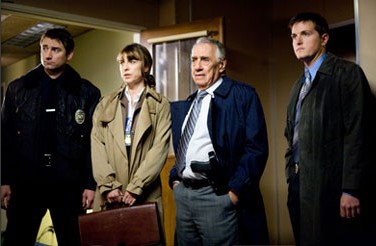
I would never in a million years suspect this is Ondaatje’s first writing/directing gig! The film is polished. The script is intriguing on so many levels. He does an impeccable job of bringing the story into the present and for anyone even remotely interested in Jack the Ripper, the film is an excellent little primer. But beyond that, his parallels to England’s Whitechapel and West Hollywood are tied up very neatly – albeit you have to pay attention to catch some of the clues. He had my attention from the getgo. Although personally, I would have liked more information and parallels on the Ripper killings incorporated into the present day murders. The characters are fully fleshed out (but for “the lodger” who appropriately remains a mystery and plays into a psychosis argument for Hope Davis’ character), but most importantly, is the manner in which each characteristic or trait of each is revealed. Slowly, deliberately and with methodical pacing – just like the murders themselves are committed. Also a bit lacking was the backstory on Manning and how his wife ended up slitting her wrists and landing in the looney bin. That was extremely unclear and a weak link in the story. Quite frankly, I think the wife could actually have been eliminated all together.
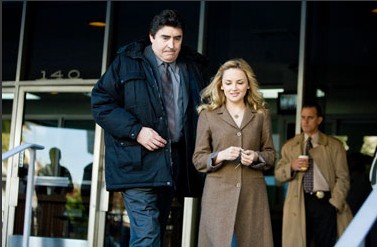
This is actually one of the few thrillers where I did not know who the actual killer was until well into the film. The script and suspense is so meticulously crafted that at any given time, suspicion looms over Ellen, Manning, Malcolm and Bunting. Really keeps your mind thinking and ups the suspense factor exponentially. Tossing in a twist of the stalking of Manning’s daughter was icing on the cake.
Let’s talk technical. Some of my biggest kudos go to the cinematography of David Armstong (crisp, clean, razor edged like the incisions of the killer) and the superb use by Ondaatje of time lapse and “focal blurring” in the opening montage. Spectacular look. Also notable is the use of color in the montage. Hand held camerawork only intensifies the suspense as do many of the close-ups on feet, walking, shoes……..riveting. The attention to detail is particularly notable as to the paper used for the killer’s notes, the red ink, the pen nib even. And let’s not forget the interplay with the sound of the different shoes on the pavement as the victims were walking and being stalked. Another nice little touch; nice little detail.
Even the score was appropriate to the tone of the film, effectively aiding in ratcheting up the tension and suspense.
An intensely visual and sensory psychological thriller, THE LODGER will bring terror to your heart and challenge your own deductive reasoning skills at every turn. It’s a killer!

Ellen – Hope Davis Chandler Manning – Alfred Molina
Malcolm – Simon Baker Street – Shane West Bunting – Donal Logue
Written and directed by David Ondaatje.












